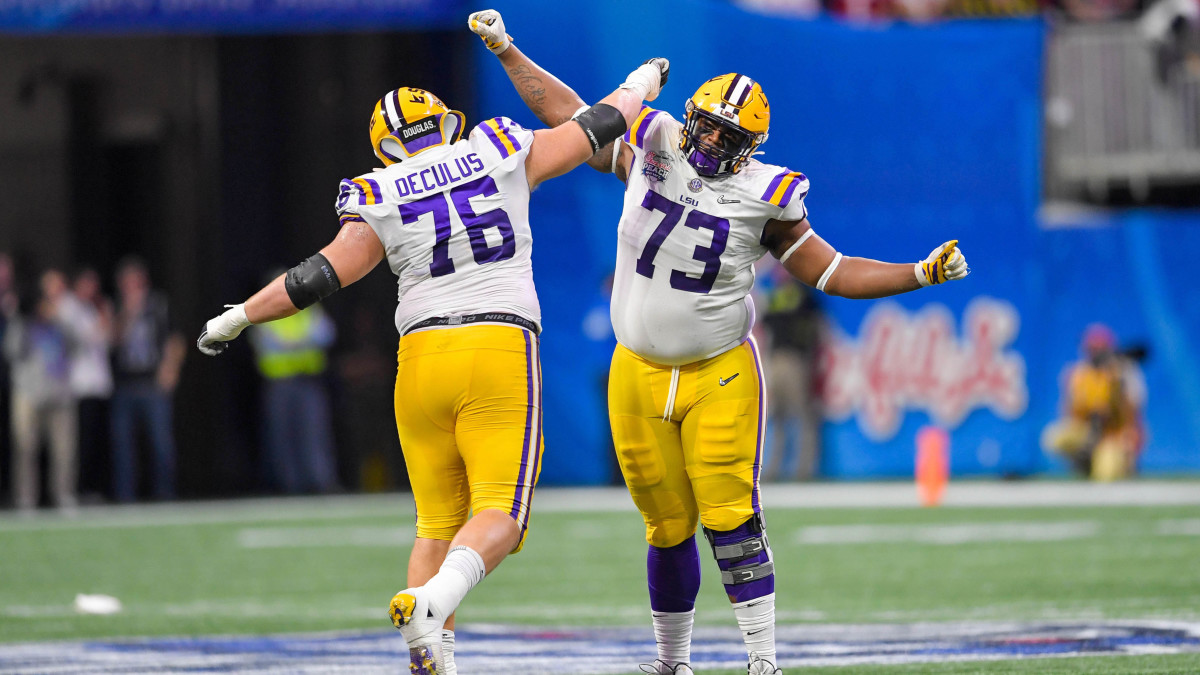LSU, Clemson Take Opposite Approach to Social Media During the Season

NEW ORLEANS — Modern day athletes have so much to deal with when it comes to fan interaction and blocking out noise. The main culprit, as everybody knows, is social media.
That’s one reason why, about seven or eight years ago before Clemson was annually playing for national championships, Clemson’s senior captains made a rule that all future teams would end up following: no social media during the season. The Tigers go dark on Instagram, Twitter, Snapchat, TikTok, etc., from the start of camp to their last game. They’re still allowed to scroll through and keep up with news, but are forbidden from posting any type of content. While coach Dabo Swinney jokes that he gets crucified for intruding on his players’ First Amendment rights every August, this policy really has nothing to do with him.
“Guys wanted to find a way to turn the program around, so they thought hard about what could help us limit distractions and keep us focused,” senior right tackle Tremayne Anchrum says. “It doesn’t matter what they say about us, what they think about us. It only matters what we think. It’s a rule that’s been passed down from team to team. Everybody has honored it, coaches have supported it, and it’s led to a lot of great instances of us not being involved in trash talk.”
Anchrum won’t lie: There have been times he’s wanted to respond or post something. “That’s just the way this generation is,” he says honestly. He remembers recently a fan tweeting negatively about the offensive line. “I was like, ‘That’s stupid’ and I wanted to give them a piece of my mind,” Anchrum says. “Then I stopped to think how a typical fan doesn’t understand everything we do.”
Added Swinney: “I just think the biggest thing about it is, in this world, it eliminates one thing they feel the need to have to do. It’s not like they’re not on it, keeping up with the world, but young people today feel like they have to respond to every nut job out there. It’s the craziest thing. It eliminates the emotion and takes a little pressure off. I don’t know, it’s worked fine for us.”

While Clemson goes off the grid, LSU’s approach is the opposite. Players are free to post pretty much whatever they want as long as they’re smart about it. “We tell them to be careful, to block out the noise, but that’s about the extent of it,” coach Ed Orgeron said at national championship media day Saturday. “I’m not going to stop it. We used to have a rule you can’t bring a phone into a meeting. If you tell them they can’t do something during the season, I think that wouldn’t work. But you don’t have to worry about me posting during the season.”
While there’s no strict policy with these Tigers, there has at least been one time when a player tweeted during a game. It was senior offensive lineman Adrian Magee, who famously quote-tweeted a post from former LSU and current Washington Redskins running back Derrius Guice in the middle of the College Football Playoff semifinal against Oklahoma. LSU was leading 49–14 at the break and cruised to a 63–28 win. Magee and his teammates don’t normally tweet mid-game, but it isn’t abnormal for players to check their phones in the locker room at halftime. “It’s no big deal, really,” Magee says.
Thanks bro❤️😊 https://t.co/obzUfxAnpa
— Adrian Magee💰🧡ひ (@Siete__tres) December 28, 2019
Instagram is the first thing that pops up on Magee’s screen when he unlocks his phone. Posting to Instagram Stories is his favorite platform to use, but he also says he has a couple of back-and-forth streaks going right now on Snapchat.
“I’m an everyday poster,” says Magee, who has 12,500 followers on Instagram. If you think that’s a lot for a college athlete, Heisman Trophy winning quarterback Joe Burrow—who is a semi-regular poster—has more than 450,000.
Most of what LSU players post is harmless, meant to be seen by friends and family. Magee’s Instagram Story this week shows silly videos of him and his teammates playing Jenga and going bowling; linebacker Jacob Phillips’s Instagram is a mix of football and hunting; wide receiver Ja’Marr Chase likes to caption his action shot posts with music lyrics; and punter Zach Von Rosenberg has been tweeting all week about how excited he is to play in the national championship game.
If posting on social media was forbidden, Von Rosenberg guesses you’d have players creating “finstas” or fake Instagram accounts. “We like to share what’s going on in our lives to an extent,” he says. “It’s memories for you because you can save what you post for future reference.” Chase was sarcastically enraged when he found out Clemson players didn’t have the same social media luxuries as them. “It’s a free world, right?” Chase said. “Why not post?”
(Chase also said that he only posts once or twice a month and has deleted all of his apps—not just the social media ones—for the playoff semifinal and title game.)
Anchrum will probably post something after the title game. Quarterback Trevor Lawrence guesses he will too, but maybe not for a few days. Some Clemson players are totally indifferent, becoming the opposite of their social media obsessed millennial and Gen Z friends.
“It teaches you to think about what you’re going to say before you post,” says Anchrum, who hopes to carry this habit forward once he leaves Clemson. “And you don’t have to respond to everything. That need is no longer important.”
Gambling: How Are The Experts Betting LSU vs. Clemson National Championship
More From Maven Team Sites:
LSU: Watch Now: LSU Releases Final Hype Video
Clemson: Behind Enemy Lines: LSU Tigers
LSU: Three Matchups to Follow
Clemson: Preview and Prediction- Clemson vs. LSU
